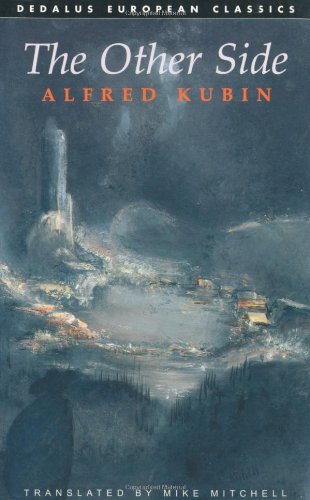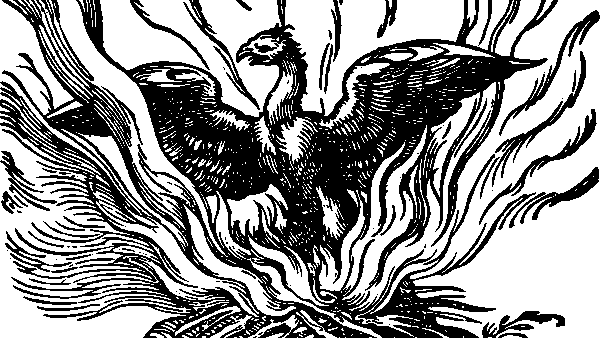What would a dream world look like? A world in which the normal rules of cause and effect don’t exist, in which social obligations are subordinate to each individual’s ability to dream? In Alfred Kubin’s vision, it looks a lot like a nightmare.
What would a dream world look like? A world in which the normal rules of cause and effect don’t exist, in which social obligations are subordinate to each individual’s ability to dream? In Alfred Kubin’s strange novel The Other Side, it looks a lot like a nightmare.

Our unnamed narrator sounds a lot like the author, Alfred Kubin: a well-known illustrator living in Munich in the early years of the nineteenth century. One night, he receives a strange visit from a man who invites him to live in a “Dream Realm” established deep in the mountains of central Asia by the narrator’s old school friend, Claus Patera.
The messenger explains the Dream Realm like this:
“The Dream Realm is a sanctuary for all those who are unhappy with modern civilisation and contains everything necessary to cater for their bodily needs… The only things our people experience are moods or, better, they exist in moods alone… All the Dreamers believe in is the dream, their dream. And these are nurtured and developed, to disrupt them would be unthinkable, would be high treason.”
The narrator resists and questions, but of course he goes there in the end. At first, everything seems wonderful. He is given a job with a generous salary and no required output. He finds beautiful and ancient works of art everywhere and buys them for a song.
But nothing makes sense. Strange visitors abound, like the bricklayer who turns up at five in the morning insisting he has been instructed to brick up the window in their living room. Another time someone delivers a packet of old cheese rinds, and when he throws them away a few weeks later, he gets an angry visit from three army officers demanding their property back.
As time passes, things get not just strange but very dark. Perhaps time passing is not the right term because time, like everything else we know, is fluid and uncertain in The Other Side. Perhaps it would be more accurate to say that as the narrator’s journey into his subconscious progresses further, things get very dark.
Soon, it’s not just his own world but also the entire Dream Realm that is falling apart. Animals invade the whole city, buildings crack and fall apart, vehicles and tools rot and decay. Reading The Other Side creates the impression that the subconscious is full of dark and twisted desires. Perhaps Kubin also wants to cast doubt on the wisdom of pursuing spiritual enlightenment and casting aside civilisation. It certainly doesn’t work too well for our narrator and the other inhabitants of the Dream Realm.
Although I found the premise of this novel fascinating, and it was certainly unlike anything I’ve read before, I didn’t exactly enjoy the reading experience and wouldn’t wish it on others. I think it would have worked well as a much shorter piece like a novella or a short story (or perhaps even better, one of the imagined books of Jorge Luis Borges), but to sustain such unreality over 320 pages is too much.
I was reminded of a more successful dream novel I read years ago, The Unconsoled by Kazuo Ishiguro. I wrote in my review at the time: “In many of his books, things are left unsaid or unexplained. His narrative style is subtle and understated. He’s the perfect person to write this kind of book.”
Kubin is the opposite of Ishiguro. He shows us everything, and as things in the Dream Realm became more fantastical and the normal laws of cause and effect broke down in more absurd and bizarre ways, my interest waned. The finale consists of a complete breakdown of every semblance of morality, with mass orgies, horrific violence, the raping of nuns, etc. Yet the more Kubin seemed intent on trying to shock me, the less I cared about what happened.
So if, like me, you’re interested in seeing dreams incorporated into fiction, I’d recommend reading The Unconsoled and giving The Other Side a miss. It’s interesting and very different, but ultimately not very successful.
I read this book for German Literature Month. Join in by reading anything that was originally written in German.





There are 12 comments
Oh my. I think I’ll skip this one. I’d much rather read Ishiguro any day 🙂
Yeah, Ishiguro’s The Unconsoled was weird in a good way!
Goodness. And I’ve got this on my piles. I thought from the beginning of your review that it didn’t sound too enjoyable. Too bad.
Thanks so much for participating. I just read something you’d love too. Judith Hermann‘s memoir. The translation will be out in April.
It’s always good to join in with the event, Caroline, even when the book turns out not be one of my favourites. Can’t believe it’s been 14 years already!
I found a sample of Hermann’s memoir in English translation (https://www.new-books-in-german.com/wp-content/uploads/2023/03/Hermann-Sample.pdf) and it looks good. Will you write about it for German Literature Month?
It’s interesting how our views on a book can vary and change. I read it in my 20s and had memories of really liking it. On a re-read in 2016 though, I was more flummoxed and found it very dark and bleak. Still intrigued, though!
Those changes over the decades are very interesting, aren’t they? I had a similar experience recently with Wuthering Heights. When I first read it as a teenager, I think I viewed Cathy and Heathcliff as great romantic heroes or something, and on returning to it recently, I was more struck by their cruelty to those around them. I still liked the book but for different reasons. I think I would probably have got more out of The Other Side when I was younger too. There is something very intriguing about it, and the darkness and violence might have bothered me less back then.
I’ll seek out Unconsoled instead. I loved Klara and the Sun, the only other Ishiguro book I’ve read.
Yes, good idea! I also loved Klara and the Sun. If you enjoyed that one, I think you’d also like Never Let Me Go because it’s a similar concept of exploring a sci-fi premise (in this case human cloning) through literary fiction.
I’ve not read either this or anything else he’s written, but I thought the way you described it iniitially was appealing.
I wonder if you read it around the time that the American election results were publicized. I was reading something that is similar thematically (an indie publication by a Quebecois writer likely unknown overseas) that got extremely dark and, after the results were so quickly tabulated, I found it ever so much harder to bear returning to that world he’d created.
Ha, you probably have a point there, Marcie! Timing is everything, and I guess my tolerance for darkness was a little fractured around 5 November 🙂
Funnily enough I was thinking that people’s dreams are the least good literary topic (I read books of dreams by both George Perec and Helene Cixous and had to drag myself though the narratives of writers I usually love) when you said it was tough going! I enjoyed your review very much, and that’s probably all I need to read. I am intrigued by Ishiguro’s The Unconsoled, though. I have never read Ishiguro which is a shocking confession! I really should start somewhere – though perhaps not with that one?
Yes, The Unconsoled is probably not the best place to start! I’ve read most of Ishiguro’s books, and my favourite is Never Let Me Go, although his big hit Remains of the Day is also excellent. I really like his first two novels too—they’re very quiet, meditative books that feel very different in style from contemporary literature.